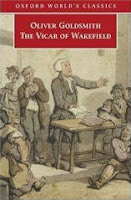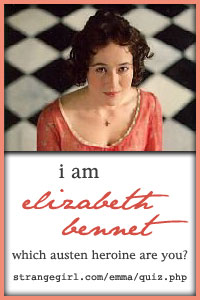I stumbled across this meme the other night and decided that if I hadn’t been tagged by the end of the weekend I’d take up Raidergirl’s open invitation. Then Bookfool tagged me! (Thanks for that).
Here are the rules:
1: Each player starts with 8 random facts/habits about themselves.
2: People who are tagged, write a blog post about their own 8 random things, and post these rules.
3: At the end of your post you need to tag 8 people and include their names.
4: Don't forget to leave them a comment and tell them they're tagged, and to read your blog.
Eight Things About Me
1. I sleep like the dead; telephones, vacuum cleaners, loud music, roaring traffic, neighbours with power tools, thunderstorms and earth tremors have all failed to wake me. My mother is the exact opposite and I’ve lost count of the number of morning conversations we’ve had like this:
‘How about that storm last night?’
‘What storm?’
‘You mean you didn’t hear it?’
‘Hear what?’
‘But it was loud enough to wake the dead!’
‘Er, well ... obviously not....’
She’s often joked about installing a cannon.
2. I will freely reveal my weight, but I will always lie about my height; I never admit to being anything less than 160cm.
3. I say I’m a lefty because that’s the hand I write with, but I’m right-handed at every sport my high school made me try ... except archery, at which I’m left-handed. I use a spoon with my left hand and scissors with my right and, bizarrely, I knit right-handed and crochet left-handed. (I’m hoping all this means I’ve got a well-balanced brain.)
4. When I was younger my bedtime reading material of choice was the Collins English Dictionary, and nowadays I can often be found browsing through encyclopaedias for fun.
5. I am fanatical about sunscreen and if it’s daylight I will never leave the house without SPF 30+, even if I’m only going to check the letterbox.
6. During exams, if I have time I’ll correct all the spelling and punctuation errors in the question paper. In red ink.
7. When I was little I used to collect rocks - any rocks. I drove my mum nuts by constantly arriving home from school with my pockets full of pebbles quarried in the sandpit. I am much more discerning now; the only rocks I bring home are of the semiprecious variety and have holes drilled in them ready to turn into jewellery. :-)
8. Strange but true: I once had the living daylights startled out of me in Phnom Penh by a gecko leaping out of a toaster.
Now I’m supposed to nominate eight more people, so I’ve hunted around for fresh blood and decided on:
Acquisitionist at Literary Acquisitionist
Dancin’ Fool at In The Pink
Marianne Arkins at Reading, Writing, and Stuff That Makes Me Crazy
RhiGirl at Slipping in the Rain
Sarah in the Sky With at Wannabe Inkling
StuckInABook at Stuck in a Book
Sulz at Bloggerdybooks!
And anyone else who feels like it.
I don’t think any of them have been tagged; if I’ve doubled up, smile because you’re popular :-). Your mission should you choose to accept it: complete this meme - and try to find facts more interesting than mine!



























